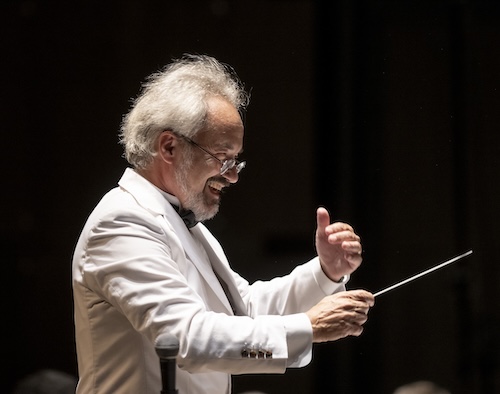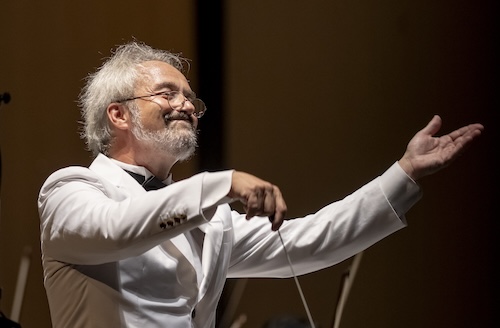Kalmar returns, serves up season highlight with stirring Bruckner, kaleidoscopic Janáček

The Grant Park Music Festival has entered its final two weeks and, as is tradition on Lollapalooza weekend, Carlos Kalmar and the musicians decamped to the indoor haven of the Harris Theater Friday night.
There is, unavoidably, a bittersweet element to this year’s final four programs, as they will mark the terminus of conductor Kalmar’s 25-year reign at the festival. The mixed results from a trio of potential successors this summer—set against the Grant Park Orchestra’s extraordinary performances under Kalmar Friday night—make it somewhat inexplicable that the plug is being pulled on what continues to be a highly successful musical partnership.
Sibelius’s The Swan of Tuonela led off the evening. Kalmar’s firmly outlined direction was stronger on presence than atmosphere, yet Anne Bach’s evocative English horn playing proved ideal. Her natural phrasing and elegant solo line fully captured the flowing grace and elegiac mystery of the title cygnus. The sensitive playing of principal cellist Walter Haman was on the same level of distinction.
Leoš Janáček’s orchestral works are not great in quantity, so all credit to Kalmar for ingenuity in programming a symphonic suite from The Cunning Little Vixen. Conductor Václav Talich—a dedicated Janáček advocate who premiered many of his works—arranged excerpts from the Czech composer’s opera with skill and sympathy, and the music flows seamlessly in an extended single movement.
Despite the surface charms and fanciful scenario of anthropomorphic animals, Vixen, like all of Janáček’s operas—ultimately paints a decidedly dark and pitiless world.
Kalmar led an idiomatic and rambunctious performance of this festival premiere, one that richly captured the myriad elements of Janáček’s score: the quirky, restless fragments—what Kalmar called the composer’s “snippety” style—the driving angularities, and soaring rhapsodic lyricism.
The Grant Park Orchestra musicians were at their considerable finest, delivering a flexible, sumptuous and kaleidoscopic performance of this individual score, with sensitive contributions from concertmaster Jeremy Black and principal flute Mary Stolper. The Cunning Little Vixen hasn’t been staged in Chicago in two decades and this engaging and communicative performance makes one long to hear the entire opera again, preferably with Kalmar at the helm.
2024 may be the bicentennial year of Anton Bruckner’s birth but you would hardly know it in Chicago. Next season the CSO is only performing a single Bruckner work (Symphony No. 3). The Berlin Philharmonic has a complete cycle on tap and will bring the composer’s Fifth Symphony to town in November but that’s about it.
So, one must be grateful for the extraordinary performance of Bruckner’s Symphony No. 4 (“Romantic”) that concluded the evening. Indeed, it’s hard to imagine that anyone could do finer justice to the Austrian composer’s music than Kalmar and the Grant Park musicians delivered Friday night.
Bruckner has not figured prominently in Kalmar’s concerts during his long festival tenure. His last Bruckner symphony performance was the Second 11 years ago. Apart from the Mass No. 2 in 2021, Kalmar has chosen to hand off music of his Austrian compatriot to guest conductors.
Yet in this performance of the epic Fourth, Kalmar showed himself a masterful Brucknerian. Even for the composer’s admirers the prolix style and repetitions can sometimes be off-putting. But Kalmar and the GPO musicians offered a stirring, humane and richly played performance that made the 70-minute journey rewarding as well as compelling.

The conductor’s initially fleet approach in the opening movement had one anticipating a fast and somewhat breathless traversal that would leave Bruckner’s lyric charm and idiosyncrasies by the wayside.
Not to worry. In this surely paced performance, Kalmar handled the long paragraphs and alternating material with consummate skill. The textures were immaculately balanced with Bruckner’s wandering flute line always audible. The climactic payoffs of the outer movements were thrilling.
Inside and sans amplification, one could appreciate the polished tone and virtuosity of the musicians and their close attention to phrasing and dynamics. This was especially true in the Andante, where the delicacy of the wind playing and the burnished beauty of the Grant Park cello section really shone.
Led by the rich and boldly projected playing of principal Jonathan Boen, the horn section provided strong impact to the hunting character of the Scherzo and clarinetist Dario Brignoli brought apt rustic character to the pastoral second trio.
Kalmar paced the epic finale deftly, making Bruckner’s faux codas and contrasting sections register effectively without provoking a “Not again” response. The final chord needed to land with greater impact Friday night, but, that apart, there was a cumulative power and sense of release in the closing section that provided the requisite effective coda.
Credit to the Grant Park players and Boen and colleagues especially, for providing the sonic muscle and lyric sensitivity required in this infinitely challenging score.